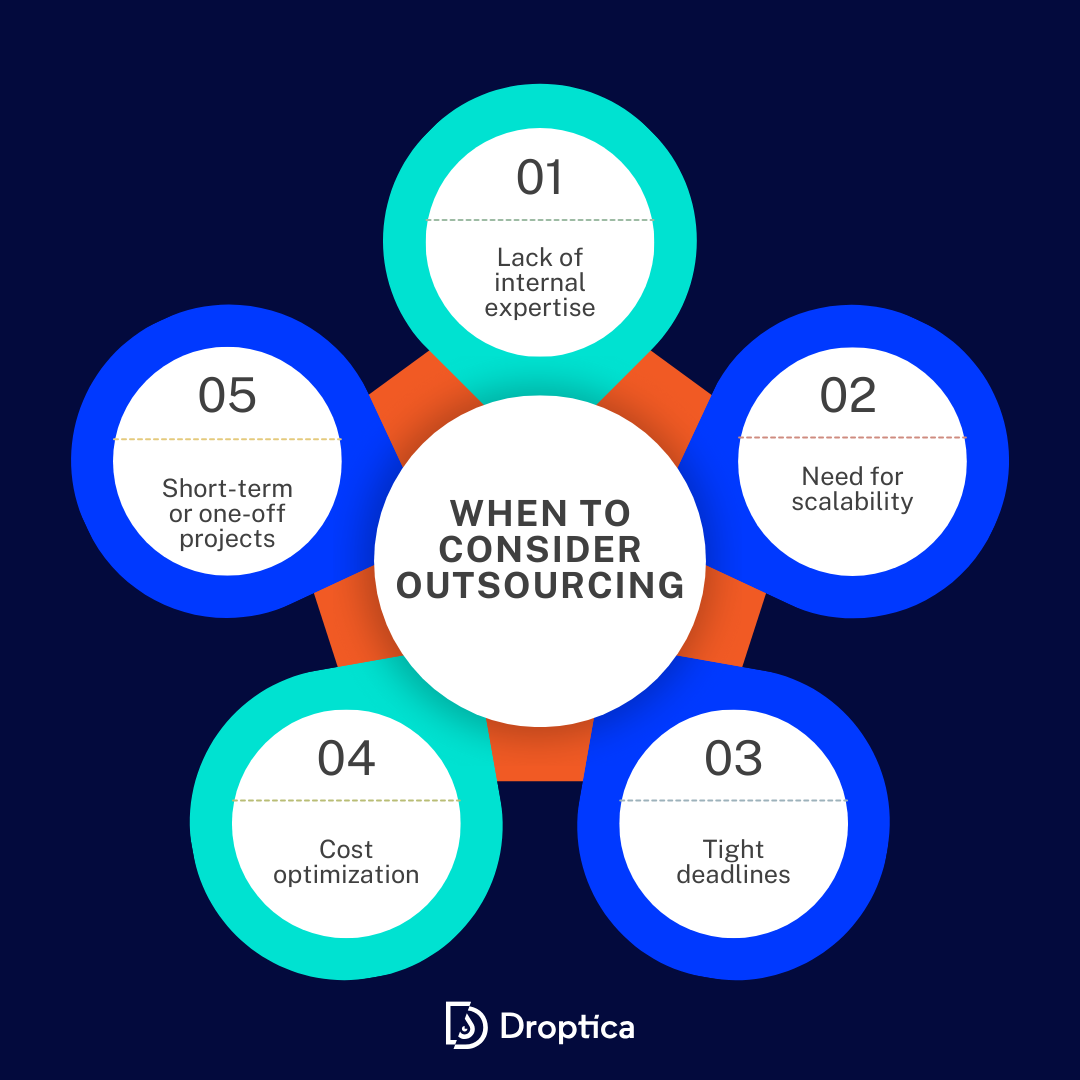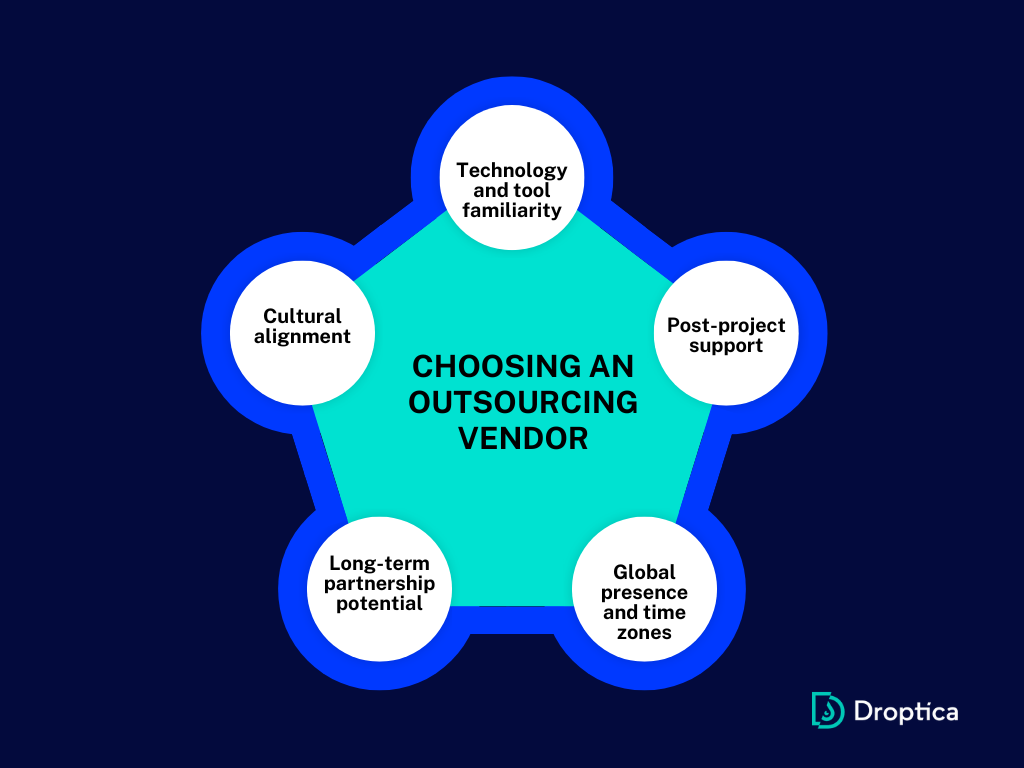
Software Development Outsourcing. When to Consider It for a Drupal Project?
In the fast-paced digital business world, efficiency and speed in executing IT projects are key to success. Deciding to outsource software development services, such as developing Drupal-based systems, can be a game-changer that helps companies save time and resources and focus on their priorities. But is outsourcing always the right decision? In this article, we’ll explore when outsourcing Drupal development makes financial and strategic sense and what benefits it can bring to your organization.
What is software development outsourcing?
Outsourcing software development is the practice of delegating specific IT tasks, projects, or processes to external vendors or dedicated teams instead of handling them internally. It allows businesses to leverage the expertise of specialists without the need to hire, train, or maintain an in-house team. This approach is particularly valuable in fast-paced industries where adaptability and rapid delivery are essential.
Outsourcing often involves partnering with professional teams or agencies located in different regions or countries. For example, a company in the U.S. may collaborate with a software development agency in Poland to take advantage of lower labor costs and access to high-quality talent. Outsourcing can range from small-scale tasks, such as bug fixes or software updates, to large-scale projects, like full system migrations or the development of complex Drupal websites.
This practice has gained significant traction due to the growing need for specialized skills, cost reduction, and scalability. In the case of Drupal, a highly customizable and robust content management system, outsourcing can provide access to experienced developers who understand the nuances of creating scalable, secure, and high-performing systems.
When should you consider outsourcing?
Outsourcing can be a strategic choice for businesses under specific circumstances. While it’s not always the perfect solution for every organization or project, specific scenarios make outsourcing viable and highly beneficial. Below are key situations when you should consider outsourcing software development projects.

Lack of internal expertise
Not all organizations have in-house teams with the necessary skills to handle complex development projects, especially when it comes to niche platforms like Drupal. Building such expertise internally can be time-consuming and expensive. Outsourcing development allows you to access specialized talent with experience in delivering high-quality, scalable, and secure CMS solutions without costly training or recruitment.
Need for scalability
Projects often require scaling up or down quickly, depending on the workload. Hiring full-time employees for temporary needs can be inefficient and costly. Outsourcing offers flexibility, enabling you to expand or reduce your team size as required without long-term commitments.
Tight deadlines
Relying solely on your internal team when faced with pressing deadlines may be insufficient. Software development outsourcing can provide the resources and expertise needed to meet your timelines without compromising quality. This is especially useful in situations like system migrations (e.g., Drupal 7 to Drupal 10 or 11) or launching new features.
Cost optimization
Outsourcing often allows you to lower operational costs by taking advantage of differences in hourly rates across the globe. For instance, developers in Eastern Europe or Asia typically charge lower rates than those in the U.S. or Western Europe. While the hourly rate is important, it shouldn’t be the sole consideration.
The total cost of a project includes more than just development time. It also involves long-term maintenance and support and risks related to delivering the project on time and at the expected quality level. Delays in project delivery can lead to missed opportunities and financial losses, especially when time-to-market is critical. Similarly, subpar quality may result in additional costs for rework or system failures.
Partnering with a reliable software outsourcing company minimizes these risks by ensuring high-quality deliverables and adherence to project timelines. A thorough evaluation of all these factors, rather than focusing solely on hourly rates, helps ensure that outsourcing remains a cost-effective strategy for your business.
Short-term or one-off projects
Outsourcing can be a practical solution for projects that require a one-time effort - like upgrading an existing system, creating a new feature, or handling a migration. This flexibility can be critical when managing seasonal workloads, product launches, or one-time system overhauls.
Outsourcing partners also often have established processes and frameworks that allow them to deliver projects faster and with higher quality than starting from scratch internally. This eliminates the need to hire full-time staff for a short-term task, helping you save time and resources.
Benefits of outsourcing Drupal services
Outsourcing Drupal development services can deliver significant advantages to businesses, particularly those looking to leverage the platform's full potential. Here are some of the most notable benefits.
Access to expertise
Drupal is a powerful but complex content management system that requires specialized knowledge to configure, customize, and optimize effectively. By outsourcing to experienced Drupal developers, you gain access to expertise that ensures your project is handled by professionals with a deep understanding of the platform’s capabilities.
Cost savings
One of the primary drivers of software development outsourcing is cost optimization. Partnering with agencies in regions like Poland enables you to reduce development costs without compromising quality. This can be especially beneficial for businesses in the high-cost areas, as it provides access to top-tier talent at more affordable rates.
Improved quality and innovation
Partnering with seasoned Drupal developers often results in higher-quality outcomes. These teams bring experience and innovative ideas, helping you build robust, scalable, and user-friendly systems that align with your business objectives.
Outsourcing vendors can leverage their experience across various industries to suggest innovative features or approaches that may not have been considered internally. Their ability to stay up-to-date with the latest technologies ensures that your project benefits from cutting-edge solutions tailored to your needs.
Faster time to market
Software development outsourcing allows you to accelerate project timelines by leveraging the resources and established workflows of an experienced team. With experts already in place, you can focus on delivering your project quickly, whether it’s a system migration, new feature development, or a full-scale Drupal implementation.
Outsourcing partners often have pre-defined processes and methodologies that streamline software development, reducing the risk of delays. Their experience with similar projects allows them to anticipate and address challenges proactively, ensuring faster and smoother delivery.
Risk mitigation
Experienced outsourcing partners often have established processes, tools, and methodologies to ensure project success. They can also help you navigate potential challenges such as compliance, security, and performance issues, reducing the risks associated with complex development projects.
Software outsourcing vendors often conduct comprehensive risk assessments to identify potential pitfalls before a project begins, reducing unforeseen complications. They also bring structured contingency plans to manage unexpected challenges efficiently, ensuring minimal disruption to project timelines.
Enhanced focus on core business
Outsourcing non-core but critical functions, such as software development, allows your internal teams to concentrate on what they do best - driving innovation and growth in your primary business areas. By offloading technical tasks to external specialists, you ensure that your core operations remain unaffected.
Scalability and flexibility
Outsourcing offers the flexibility to scale your development team up or down based on your project’s needs. This is particularly useful for handling peak workloads or accommodating changes in project scope without hiring or laying off internal staff.
Additionally, outsourcing enables companies to adapt to fluctuating market demands quickly. Whether you need extra resources during a product launch or want to scale down after completing a project, an outsourcing partner provides the agility to adjust without long-term commitments.
Moreover, by leveraging the established workflows and experience of outsourcing teams, businesses can achieve scalability without sacrificing quality or efficiency.
What to look for when choosing an outsourcing vendor
Selecting the right outsourcing vendor is one of the most critical decisions in ensuring the success of your project. The right partner can minimize risks and maximize the benefits of software development outsourcing by delivering high-quality results efficiently and effectively. Here are some key considerations to keep in mind.

Cultural alignment
A successful outsourcing relationship often hinges on cultural compatibility. Shared values, work ethics, and seamless communication can foster better collaboration between your team and the outsourcing vendor. Cultural alignment reduces misunderstandings and helps ensure that both sides are working towards the same goals with a clear understanding of expectations.
Technology and tool familiarity
Your outsourcing vendor should be well-versed in the technologies, tools, and frameworks integral to your project. For instance, experience with specific modules, hosting platforms, and integrations is critical in Drupal development. At Droptica, we ensure compatibility by tailoring our approach to match the client’s preferred toolset, ensuring a smooth and efficient collaboration.
Long-term partnership potential
While many outsourcing web development projects begin as one-time engagements, the potential for a long-term partnership can yield significant advantages. Reliable outsourcing vendors provide consistent value over time by understanding your business deeply and offering tailored solutions. Droptica builds trust through proven expertise and a commitment to long-term client success.
Global presence and time zone considerations
Time zone differences can pose challenges in communication and coordination. Having a contact person in the client’s time zone can significantly improve collaboration. At Droptica, we have a dedicated representative based in the U.S. who enables real-time communication with North American clients.
Additionally, overlapping work hours for critical tasks can enhance efficiency, which is supported by asynchronous tools like email and Slack.
Post-project support
Outsourcing isn’t just about delivering the project. It’s also about ensuring its long-term success. Reliable support and maintenance are critical for addressing issues, implementing updates, and running the system smoothly. Droptica ensures ongoing client satisfaction with dedicated support teams and proactive maintenance services.
Tips for evaluating software outsourcing vendors
Evaluating and choosing an outsourcing vendor requires more than finding a technically capable partner. It involves selecting a collaborator who aligns with your goals and can deliver consistent results. Below are practical steps to identify the ideal vendor:
- Understand their approach to problem-solving. A good vendor should demonstrate their ability to tackle challenges proactively. Request examples of how they’ve handled unexpected issues in previous projects.
- Consider their team’s stability and experience. A stable and experienced development team often indicates the vendor’s reliability and ability to deliver long-term support. Ask about employee turnover rates and team members’ qualifications.
- Assess the portfolio. Review the vendor’s previous software development projects to see if they have experience in similar industries or with technologies relevant to your project. A strong portfolio often reflects the vendor’s ability to deliver high-quality work.
- Check references. Ask for client references and speak with them to understand their experiences. Look for feedback on communication, delivery timelines, and the overall quality of the deliverables.
- Verify certifications. Ensure the vendor adheres to industry standards such as ISO27001 for information security. Certifications are a good indicator of a vendor’s commitment to best practices.
- Start small. Begin with a smaller software project or a trial period to evaluate the vendor’s capabilities and compatibility with your team. This approach helps mitigate risks and builds trust before committing to larger engagements.
- Evaluate communication practices. Ensure the vendor has clear communication channels, a designated point of contact, and processes for regular updates. Effective communication is vital for a smooth collaboration.
- Evaluate their scalability and resource allocation. Ensure that the vendor can scale resources up or down based on the changing needs of your software project. A reliable partner should have a flexible talent pool and the ability to adjust dedicated team size without affecting quality or timelines. Ask about their process for onboarding additional team members and how they handle multiple projects simultaneously to avoid resource constraints.
By following these steps, you can identify a partner who is well-equipped to meet your project requirements while minimizing risks.
Risks of outsourcing software development and how to mitigate them
While outsourcing offers numerous benefits, it’s not without its challenges. Being aware of potential risks and taking proactive steps to mitigate them can make your software development outsourcing journey smoother and more successful. Here are some common risks and strategies to address them.
Communication challenges
Working with teams across different time zones or cultures can lead to misunderstandings and misaligned expectations.
How to mitigate:
- Establish clear communication channels and protocols (e.g., regular video calls, progress updates).
- Use project management tools like Jira or Trello to track progress and maintain transparency.
- Ensure language proficiency and cultural awareness within the teams.
Time zone differences
Managing teams in different time zones can create challenges in coordinating meetings, resolving issues quickly, or maintaining project momentum.
How to mitigate:
- Assign a dedicated point of contact in the client’s time zone to ensure seamless communication and quick issue resolution.
- Plan overlapping work hours for critical tasks and meetings to maximize efficiency.
- Utilize asynchronous communication tools like Slack or email to keep everyone informed regardless of time zones.
Data security and privacy concerns
Sharing sensitive data with an external vendor can raise security and compliance concerns, especially in industries with strict regulations.
How to mitigate:
- Partner with vendors that comply with recognized security standards like ISO 27001.
- Use NDAs (Non-Disclosure Agreements) and detailed contracts to protect your intellectual property.
- Implement secure data transfer methods and restrict access to sensitive information.
Quality control issues
The quality of deliverables can sometimes fall short of expectations if the vendor lacks proper oversight or expertise.
How to mitigate:
- Clearly define quality standards and KPIs (Key Performance Indicators) in the contract.
- Conduct regular code reviews and testing during the development process.
- Choose vendors with proven experience and a strong portfolio.
Dependency on external teams
Over-reliance on an outsourcing partner can create a dependency that may be difficult to break if issues arise.
How to mitigate:
- Maintain some level of in-house expertise to oversee and collaborate with the external team.
- Diversify vendors to avoid putting all your eggs in one basket.
Hidden costs
Unexpected costs can arise if the project scope isn’t clearly defined or additional services are required.
How to mitigate:
- Create a detailed and comprehensive contract that outlines all costs upfront.
- Include clauses for scope changes and ensure transparency in billing.
Vendor reliability
Choosing the wrong development outsourcing vendor can lead to missed deadlines, subpar work, or even project abandonment.
How to mitigate:
- Conduct thorough due diligence when selecting a vendor, including checking references and reviews.
- Start with smaller, less critical projects to evaluate the company’s performance before committing to more significant tasks.
Software outsourcing services
Outsourcing software development, particularly for Drupal-based projects, can be a transformative strategy for businesses aiming to optimize costs, access specialized expertise, and scale efficiently. By recognizing the right scenarios for outsourcing and carefully selecting reliable partners, companies can unlock significant benefits while minimizing risks.
The key to successful outsourcing lies in preparation and collaboration. Clear communication, detailed contracts, and a focus on security and quality assurance are essential to a smooth software outsourcing journey. By partnering with experienced professionals, businesses can ensure that their projects are delivered on time, within budget, and to the highest standards.
If you’re considering outsourcing your Drupal development needs, we offer a proven track record of delivering high-quality solutions tailored to different business goals.











